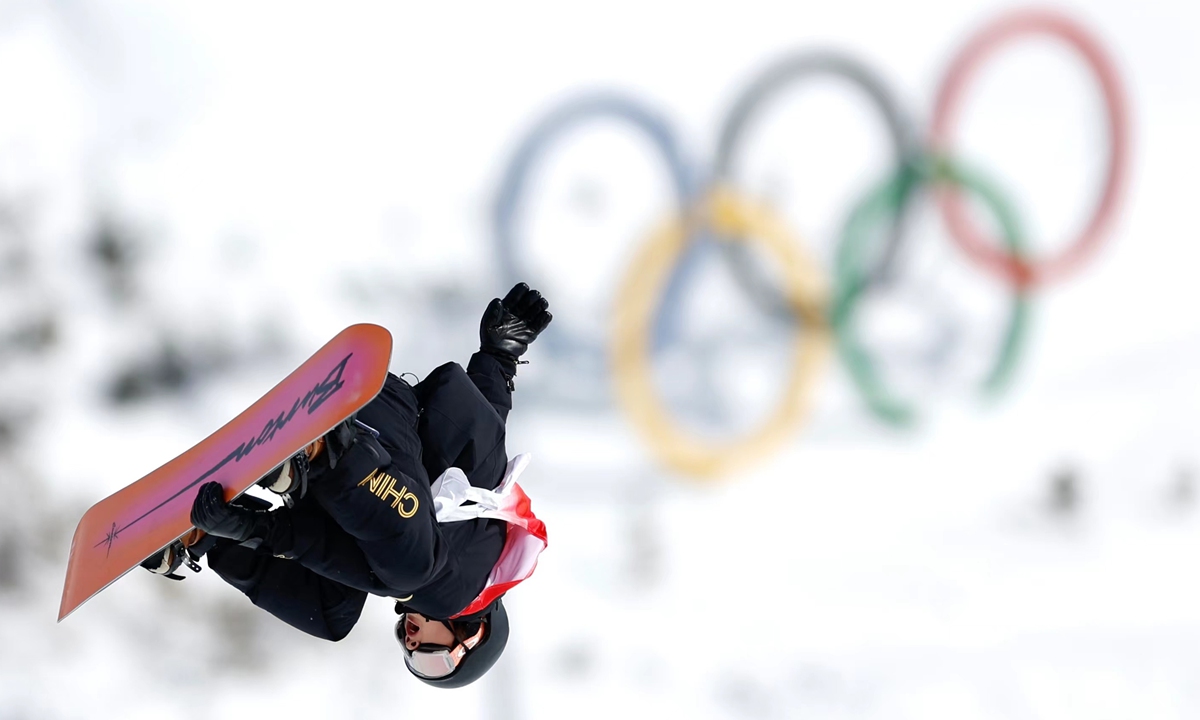
Su Yiming competes in the men's slopestyle final at the Beijing 2022 Winter Olympics on February 7. Photo: VCG
After the US hosted the Winter Olympic Games in 1960, the ski industry of the country boomed. The Games precipitated a 30-year period of growth that created much of the infrastructure seen today at Lake Tahoe. The local number of homes increased five-fold, from about 7,000 in 1960 to 35,500 in 2000.
After the Squaw Valley Winter Games, Americans' enthusiasm for winter sports became proof of the event's effective success. With that in mind, the current prevalence of winter sports in China is just a repeat of the normal trajectory through which a sport becomes popular. But to US media outlets with ulterior motives, such as The New York Times, any "unusual" enthusiasm in China stems from the government and the ruling Communist Party of China (CPC)'s push for national rejuvenation and prosperity.
According to this logic, the winter sports craze in the US also stemmed from the government's efforts to promote the prosperity of the American nation; while the rapid development of winter sports industry in France and Japan respectively after they hosted the Winter Olympic Games was a result of the two countries' nationalist efforts.
This kind of simplistic thinking embarrassingly falls flat on its face. The enthusiasm toward winter sports in China reflects the success of the 2022 Winter Olympic Games as well as the spirit of the International Olympic Movement. Virginie Faivre, president of the Organising Committee for the 3rd Winter Youth Olympic Games in Lausanne, Switzerland in 2020, once told the Xinhua News Agency that youth is the broad base for sport and the original purpose of the Olympic Games is to inspire future generations. What is happening in China is a good reflection and implementation of that very intention.
Su Yiming and Gu Ailing, the former locally trained in China while the latter American-trained, are enjoying the current Winter Games. They can represent the foundation of winter sports in China and the US. However, Western media outlets describe one as the result of nationalism and the other as pursuit of an interest, in a bid to smear China's athletics sphere. This is mindless.
But if Chinese people don't show any favor for winter sports while hosting the Winter Games, the tact employed by the NYT and its cohorts is predictable as it is laughable; they would criticize Beijing's Olympic hosting efforts as a colossal waste of billions of dollars for not much in return. For media publications like the NYT, there's always an avenue through which to lambaste China. But such dull-witted slander will only ever leave them with egg on their face.
Unsurprisingly, the NYT mentioned the CPC and the Chinese government, with a crystal-clear intent to link China's current enthusiasm for winter sports to the "authoritarian" image Western outlets continue to portray. They wish to create this skewed impression for those who don't wish to consider sensationalism over fact with the lie that Chinese people cannot even have free choice in taking up sports because they are under the control of "the evil CPC."
Nevertheless, if any reporter worth their salt were to dedicate more time considering the history of winter sports in China, they would not make such a laughable argument.
Unsurprisingly, the NYT's latest article that smears China mentioned the CPC and the Chinese government's campaign to transform China into a global winter sporting power has been ongoing since 2015. It insinuates that the CPC's campaign is the reason why once rare scenes, in which a group of retired men in Northeast China's Liaoning Province gathered every day in the winter to play ice hockey on an outdoor ice rink, are growing more common.
In actual fact, sports like skating, sledding, and even ice hockey have long been common ways of entertainment for generations of people in northeastern China in the winter. As far back as the 1970s, people in northeastern China were playing ice hockey. It is irresponsible to call these already popular activities "once rare scenes" just for the purpose of selling sensationalist narratives wholly disregarding basic ethics in the field of journalism. The Beijing 2022 Winter Olympic Games have only added fuel to an already existent burning passion for winter sports in China. Documents show that China's ski industry started to grow in the 1990s as the 1996 Asian Winter Games in China encouraged people to explore ice and snow sports. As we entered the 21st century, the number of skiers grew rapidly and reached 20.9 million in 2019.
It is true that the Beijing 2022 Winter Games helped to further the development of winter sports in China. But it is a post hoc ergo propter hoc argument to say China purposefully promotes winter sports due to the Winter Games. As for media outlets like the NYT, such blatant calumny against China shows the calculated hand being played in the hopes of gaining notoriety among the anti-China elites, but even fabricated articles fail in the face of an undeniable truth.
The author is a reporter with the Global Times. opinion@globaltimes.com.cn




